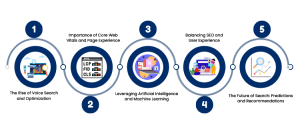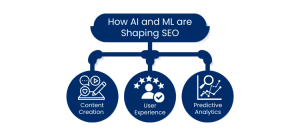to us to know how to promote business on the World Wide Web. We tell
them about different strategies that they can use different stages of their growth.
ContactUs
- +91-810-362-8856
- 106, Silver Arc Plaza, Janjeerwala Square, Indore – 452001, MP, India
-
Mon-Fri: 9am-8pm
Sat: 10am-6pm
Sun: Closed
Follow Us
SEO in 2024: Emerging Trends and Strategies
As the digital landscape continues to evolve, SEO remains a crucial strategy for businesses looking to enhance their online presence. In 2024, several emerging trends and strategies are set to reshape the way we approach search engine optimization. This blog will explore these key trends, offering insights into how businesses can adapt to stay ahead of the competition.

1. The Rise of Voice Search and Optimization
Voice search has been gaining traction for several years, but 2024 is expected to be a defining year for its widespread adoption. With the increasing popularity of smart speakers, virtual assistants, and voice-activated devices, more users are turning to voice search for quick and convenient answers.
Why Voice Search Matters:
Voice search queries tend to be longer and more conversational than traditional text searches. Users are asking questions in a natural language, which means that optimizing for voice search requires a different approach. The key to success lies in understanding user intent and crafting content that directly addresses the specific questions users are asking.
How to Optimize for Voice Search:
• Focus on Conversational Keywords:
Instead of relying solely on short, generic keywords, businesses should incorporate long-tail keywords and phrases that mimic natural speech patterns.
• Create FAQ Pages:
FAQ pages are an excellent way to capture voice search traffic. They provide direct answers to common questions, which aligns with how people use voice search.
• Optimize for Local Search:
Voice search is often used for local queries, such as “near me” searches. Ensuring that your business is optimized for local SEO, including having accurate and up-to-date Google My Business listings, can significantly boost your visibility in voice search results.
Read more: How Do I Optimize My Site for Voice Search?
2. Importance of Core Web Vitals and Page Experience
In 2024, Google’s Core Web Vitals will continue to play a pivotal role in determining search rankings. These metrics—Largest Contentful Paint (LCP), First Input Delay (FID), and Cumulative Layout Shift (CLS)—are designed to measure the quality of a user’s experience on your website.
Why Core Web Vitals Matter:
Google has made it clear that user experience is a critical factor in search rankings. Websites that provide a smooth, fast, and visually stable experience are more likely to rank higher in search results. As a result, optimizing Core Web Vitals is no longer optional—it’s a necessity.
How to Improve Core Web Vitals:
• Optimize Loading Times:
Focus on reducing LCP by optimizing images, using faster hosting, and minimizing JavaScript. A fast-loading website keeps users engaged and improves overall satisfaction.
• Enhance Interactivity:
Improve FID by minimizing the use of heavy JavaScript files that can delay the time it takes for a page to become interactive.
• Ensure Visual Stability:
Reduce CLS by setting size attributes for images and videos and avoiding unexpected content shifts that can frustrate users.
3. Leveraging Artificial Intelligence and Machine Learning
Artificial intelligence (AI) and machine learning (ML) are revolutionizing the SEO landscape, allowing businesses to gain deeper insights into user behavior and tailor their strategies accordingly.
How AI and ML are Shaping SEO:
• Content Creation:
AI tools can analyze vast amounts of data to identify trending topics, suggest keywords, and even generate content ideas that resonate with your audience.
• User Experience:
ML algorithms can personalize the user experience by analyzing behavior patterns and adjusting content recommendations in real-time.
• Predictive Analytics:
AI-driven predictive analytics can forecast search trends, allowing businesses to stay ahead of the curve and create content that meets future demand.
How to Leverage AI and ML in SEO:
• Implement AI-Powered Tools:
Use AI tools like chatbots and recommendation engines to enhance user engagement and improve conversion rates.
• Analyze User Data:
Leverage ML algorithms to analyze user data and refine your SEO strategy based on real-time insights.
• Automate Routine Tasks:
Automate repetitive SEO tasks, such as keyword research and performance tracking, to free up time for more strategic activities.
You may also like: How AI is Transforming Digital Marketing?
4. Balancing SEO and User Experience
While SEO is essential for driving traffic, user experience (UX) is what keeps visitors engaged and encourages them to convert. In 2024, finding the right balance between SEO and UX will be more critical than ever.
The Intersection of SEO and UX:
• Content Structure:
A well-structured website with clear navigation not only improves UX but also makes it easier for search engines to crawl and index your content.
• Mobile Optimization:
With the majority of web traffic coming from mobile devices, a mobile-friendly design is crucial for both SEO and UX. Google’s mobile-first indexing means that mobile-optimized sites are more likely to rank higher in search results.
• Page Speed:
Fast-loading pages enhance user experience and are a key ranking factor in Google’s algorithm.
Strategies for Balancing SEO and UX:
• Prioritize Mobile-First Design:
Ensure that your website is fully responsive and provides a seamless experience across all devices.
• Focus on Content Quality:
High-quality, relevant content that addresses user needs will satisfy both search engines and your audience.
• Simplify Navigation:
A clean, intuitive navigation structure enhances UX and helps search engines understand the hierarchy of your content.
5. The Future of Search: Predictions and Recommendations
As technology continues to evolve, so too will the search landscape. Looking ahead, we can expect several key trends to shape the future of SEO.

Emerging Trends:
• Visual and Video Search:
With the rise of platforms like Pinterest and YouTube, visual and video search will become increasingly important. Businesses should optimize their visual content with descriptive alt text, video transcripts, and relevant keywords.
• Semantic Search:
Search engines are getting better at understanding the context and intent behind queries. This means that creating content that addresses the underlying questions and concerns of users will be more important than ever.
• Hyper-Personalization:
The future of SEO will likely involve even greater levels of personalization, with search engines delivering highly tailored results based on individual user behavior and preferences.
Recommendations for Staying Ahead:
• Invest in Multimedia Content:
Incorporate a mix of text, images, and video into your content strategy to capture traffic from various search channels.
• Focus on Intent-Based Content:
Shift your focus from keyword density to understanding and addressing user intent.
• Stay Agile:
The SEO landscape is constantly changing. Stay agile by keeping up with the latest trends, experimenting with new strategies, and being willing to adapt as needed.
Conclusion: Evolving SEO Landscape in 2024
The SEO landscape in 2024 is set to be more dynamic and complex than ever before. From the rise of voice search and the importance of Core Web Vitals to the integration of AI and the balancing act between SEO and UX, businesses will need to stay informed and adaptable to succeed. By embracing these emerging trends and strategies, you can position your brand for success in the ever-evolving world of search.
As we move forward, one thing is clear: SEO is no longer just about keywords and rankings. It’s about creating a comprehensive digital experience that meets the needs of your audience while satisfying the ever-changing demands of search engines. Stay ahead of the curve by focusing on user intent, optimizing for new technologies, and continuously refining your approach. The future of SEO is bright, and those who adapt will thrive.
